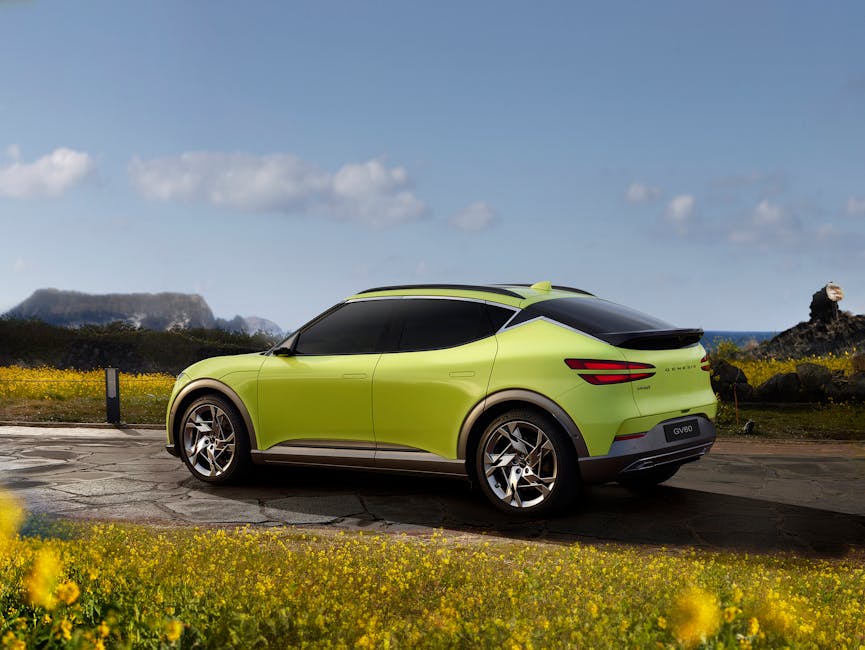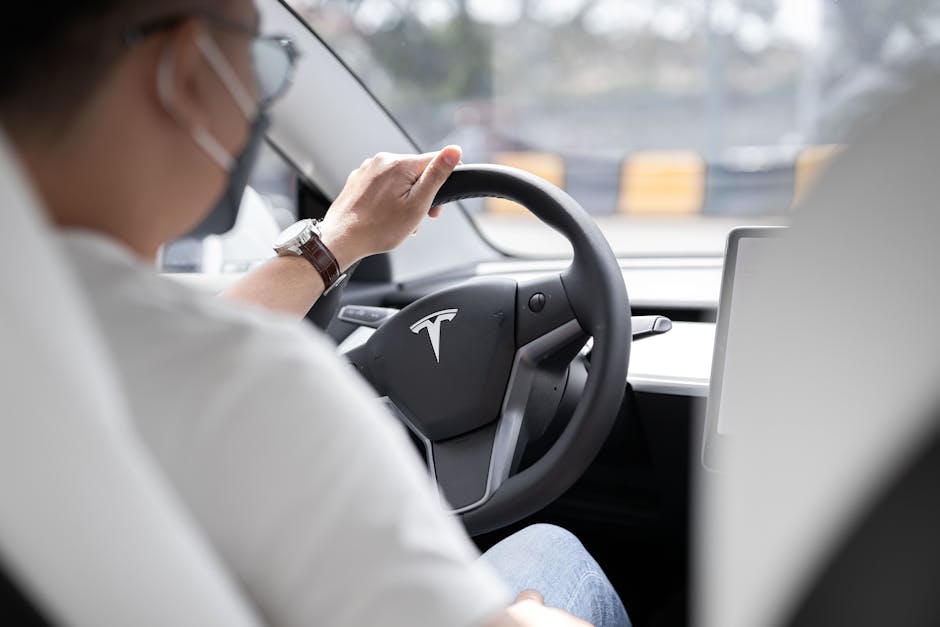Harnessing AI for Personalized EV Driving Experiences
As electric vehicles (EVs) continue to revolutionize the auto industry, the fusion of artificial intelligence (AI) and machine learning is paving the way for a new era of personalized driving. Imagine a vehicle that knows your driving habits, preferences, and even your emotional state—tailoring its performance and features just for you. In this article, we’ll explore how cutting-edge AI technologies are creating bespoke EV experiences that prioritize efficiency, comfort, and driver satisfaction. The future of driving isn’t just about going electric; it's about having a vehicle that truly learns and adapts to you.
The Rise of AI in the Electric Vehicle Landscape

Electric vehicles are not just about sustainability; they also represent a significant leap in automotive technology. With the integration of AI, manufacturers can analyze massive datasets to refine their vehicles’ functionalities. For instance, Tesla's Autopilot feature uses machine learning algorithms to enhance the driving experience by adapting over time to user behavior and preferred routes. This ability to learn is a game-changer, as it opens doors to innovations that create tailor-made solutions for every driver.
AI in EVs goes beyond mere navigation and driver assistance. It’s also about enhancing comfort and convenience. As electric vehicles become an everyday choice for commuters, understanding how AI can personalize these experiences becomes imperative for manufacturers looking to attract a dedicated user base. From adjusting temperature settings based on prior preferences to optimizing driving modes according to traffic conditions, AI creates a seamless integration between driver and machine.
Personalization: The Key to Driver Satisfaction

At the heart of the enhanced driving experience is personalization, and AI has an unmatched capability for data analysis. Collecting data on how a driver accelerates, brakes, and uses in-car entertainment can provide invaluable insights. For example, AI systems can recommend the most efficient driving mode based on your past behaviors, whether you favor a sportier feel or a more eco-friendly approach.
But personalization doesn’t just stop at performance. Modern EVs are beginning to integrate adaptive interior modifications, such as adjustable ambient lighting and custom sound settings. Andrew O'Hara, an expert in automotive technology, notes that "The Psychological Aspects of how drivers interact with their cars will define future innovations." Allowing a vehicle to adapt its interface—changing display colors or configuring infotainment settings in response to mood or time of day—can transform everyday drives into uniquely enjoyable experiences.
For deeper insights into personalization, you might also be interested in this fascinating read on how AI-Powered Personalization is shaping the driving experience of the future.
Machine Learning: Adapting to Individual Habits

Machine learning, a subset of AI, plays a pivotal role in streamlining this personalization. As the vehicle gathers data, it continually fine-tunes its algorithms to represent the individual driver's needs better. For example, a vehicle equipped with machine learning capabilities can analyze a driver’s patterns—such as their preferred routes and speed choices—and combine this information with real-time traffic data to create an efficient, hassle-free commute.
This technology can also elevate safety and efficiency in daily driving. Adaptive cruise control systems, which adjust a vehicle's speed according to surrounding traffic, can learn specific driving styles. As a result, the system not only responds promptly to obstacles but can also simulate a natural flow for the driver, improving both safety and comfort.
The Emotional Connection: Understanding Driver Behavior

Technology is permeating our lives more deeply, but it is the emotional connection that solidifies the relationship between driver and machine. By employing techniques that analyze biometric data—such as heart rate and even facial expressions—future EVs can learn when a driver feels stressed or relaxed. Imagine an EV that offers calming music or adjusts the interior lighting to promote relaxation during a high-stress commute.
Moreover, understanding a driver’s emotional state can influence performance, enhancing comfort levels during different driving scenarios. Such technology goes beyond mere convenience; it can vastly improve overall satisfaction and foster a deeper bond between a driver and their vehicle.
Responsible Data Usage: Privacy Matters

While the benefits of AI-driven personalization are immense, it’s crucial to address the implications of extensive data collection. Drivers must trust that their data is being handled securely and ethically. Car manufacturers are tasked with ensuring transparency in data usage policies and empowering consumers with control over their information.
Today's consumers are increasingly aware of privacy issues, so manufacturers must prioritize secure data practices. Regulations like the General Data Protection Regulation (GDPR) in Europe highlight the importance of data privacy and give consumers rights over their information. Building systems with these principles in mind can enhance trust and satisfaction as drivers embrace this next wave of automotive technology.
For more on the implications of privacy in this context, check out sources like Harvard Business Review.
The Future of Electric Vehicles: Trends to Watch

As we look ahead, here are some key trends indicating how AI and machine learning will redefine the EV landscape:
-
Predictive Maintenance: Future systems will leverage AI to predict maintenance needs, alerting the driver before issues arise. This proactive approach can lead to significant cost savings and reduce downtime.
-
Enhanced User Interfaces: Voice recognition and proactive AI suggestions will allow for communication that feels like a conversation with a trusted friend—answering queries, providing updates, and making recommendations based on preferences.
-
Adaptive Energy Management: AI will optimize battery usage by learning each driver’s habits and journeys, ensuring maximum efficiency for daily routes, longer drives, or those unexpected detours.
-
Seamless Integrations with Smart Homes: Picture an EV that communicates with your smart home to ensure everything is coordinated. Arriving home after a long day could trigger your house to warm up, play your favorite music, and switch on the lights as you park in the driveway.
-
Granular Personalization with AI Algorithms: Future EVs may feature finely-tuned algorithms that adjust based on not only geographic barriers but also user feedback, creating a continual improvement cycle that enhances the driving experience in real-time.
Real-world Applications: Leading the Charge

Several industries are already guiding the charge ahead. Companies like Waymo and Rivian are pioneering AI technologies that delve into personalized responses and driver adaptability. Waymo leverages vast data from autonomous vehicle trials to refine machine learning applications, while Rivian focuses on adventurous terrain adaptations—offering personalized features for outdoor enthusiasts.
Moreover, global discussions on sustainable practices are crucial. As highlighted in sustainable design trends, combining eco-friendliness with technological advancements will shape the design ethos of future EV models.
With the collaboration of manufacturers, tech developers, and thoughtful engineers, the EV market will thrive. As vehicles grow smarter, they will embody a union of efficiency, eco-friendliness, and personalized comfort, setting an extraordinary precedent for future innovations.
Next Steps: Embracing AI in EVs
As we stand on the brink of unprecedented changes within the automotive sphere, it’s essential for drivers to engage with this technology mindfully. Here are actionable steps you can take:
-
Stay Informed: Keep up with the EV market and explore how manufacturers are implementing AI and machine learning.
-
Prioritize Privacy: Research the privacy policies of manufacturers before purchasing an EV. Understanding how your data will be utilized is crucial in building trust.
-
Experiment with Features: Once in an EV that employs AI, take the time to customize settings and give feedback—this data loop contributes to enhancing personal experiences.
-
Share Your Experience: The more people share their personalized driving experiences—whether through social media, blogs, or forums—the easier it will be for manufacturers to understand consumer needs.
In conclusion, as we drive toward a future of electric vehicles, the integration of AI and machine learning will fundamentally change how we interact with our cars. With personalization at the forefront, the relationship between driver and vehicle will transform into a partnership that heightens satisfaction and cultivates a profound sense of trust. The roads ahead look exciting, innovative, and tailored just for you.



